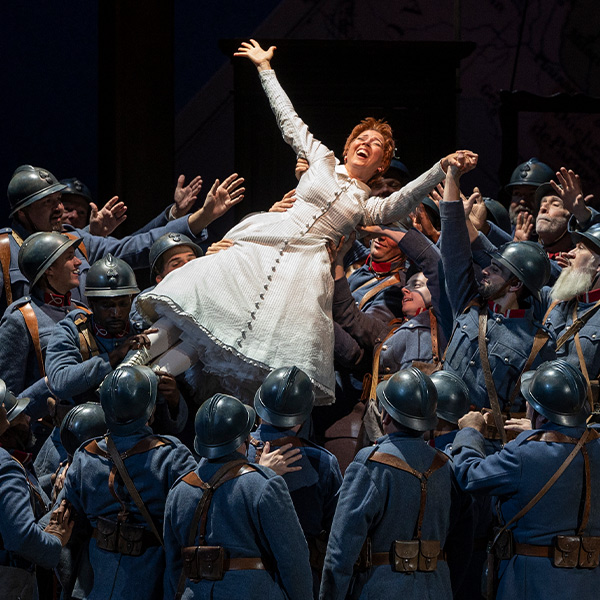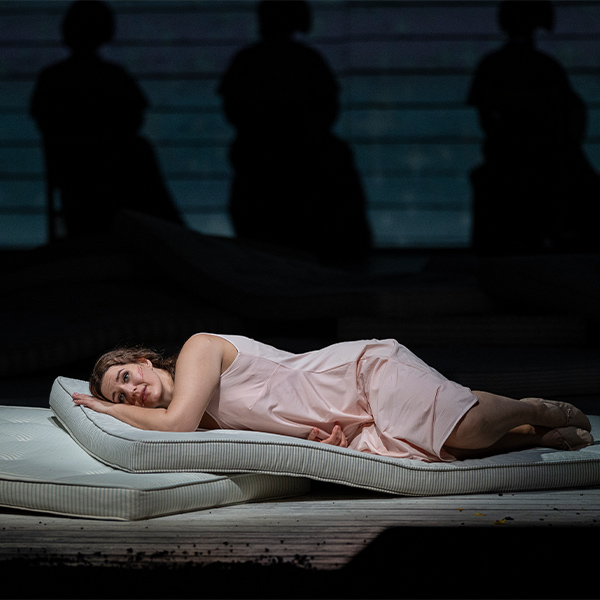November 20, 2023
Versatile voices
The chorus plays a significant role in the storytelling of both Donizetti's The Daughter of the Regiment and Janáček’s Jenůfa — though the roles (and the operas) could not be more different. Here, two members of Lyric’s Regular Chorus talk about preparing for the widely varying demands.
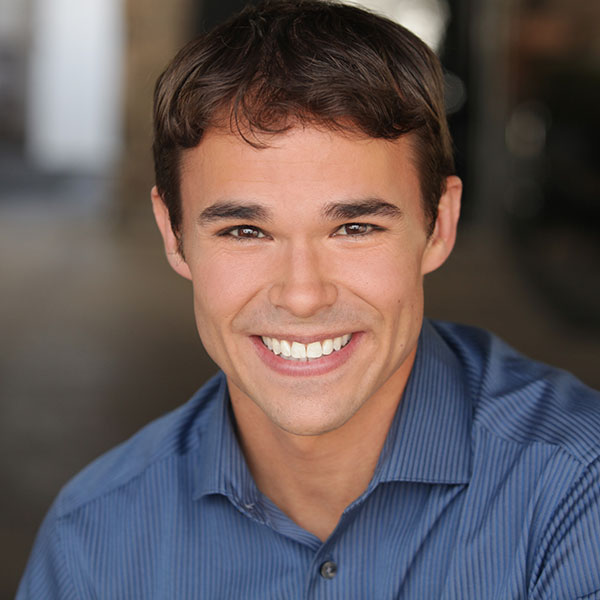
Jonathan Wilson's first performance at Lyric Opera of Chicago was supposed to be Götterdämmerung, which began rehearsals in January 2020 and ultimately became a casualty of the pandemic. Instead, the baritone in Lyric's Regular Chorus got his first Lyric performance credit in the award-winning filmed version of Pagliacci. He made his mainstage debut in the chorus for Macbeth, the fiery opening work of the 2021/22 Season.
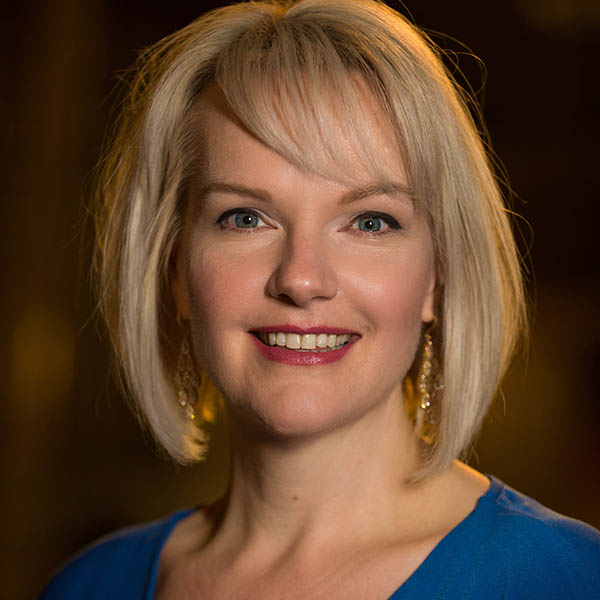
Soprano Kimberly McCord began her tenure with the Chorus in the 2007/08 Season, and covered two roles in Die Frau ohne Schatten. An accomplished soloist in her own right, at Lyric she created the role of the German Diplomat in Lopez's Bel Canto (2015/16) and has performed frequently around Chicago, including seven roles with Haymarket Opera, among them Purcell's Dido and Costanza in Haydn's L'isola disabitata.
Operas sung in Czech are fairly rare — has that been interesting for you?
Wilson
It is definitely an exciting challenge. I think that the expectation, even for people who are auditioning for the Chorus for the first time, is that you have the operatic background of singing diction in English, Italian, French, German, Spanish — and then at least touching on several other languages, like Latin.
McCord
We actually had an excellent Czech diction coach come to a few of our music rehearsals. [Chorus Director and Head of Music] Michael Black had met with her before the season started, to make sure that he could lead us in a way that was going to be as authentic as possible before we even were in front of her. And then we're also very lucky with Jenůfa, in the sense that the conductor, Jakub Hrůša, is Czech himself.
Wilson
Some members of the Chorus have sung in Czech before, or have studied Czech diction, but it's not universally expected. We get extra resources.
For instance?
Wilson
The musical staff is very sure to get us access to Czech diction books. The Lyric library provides printouts with international phonetic alphabet pronunciation. And it's all reflected in how the rehearsals work. Our music rehearsals for Daughter and our music rehearsals for Jenůfa have different emphases. Practically everyone in the room has at least an elementary understanding of French grammar and diction. So you naturally know where the emphasis in the sentence goes, or where the stressed syllable is in a given word — because you've spoken that, you've taken classes on that. Our ultimate goal is to make sure we're all pronouncing things exactly the same way with the right emphasis, with the right rhythm. And so in French that can be the emphasis from rehearsal one. Whereas Czech has consonant clusters, sounds that are not as traditional as in those four traditional languages. And so we need to get very technical at the start.
Have you sung in Czech here before?
McCord
The last time we did a show in Czech was Dvorak's Rusalka, in 2013/14. There was Káťa Kabanová, and that was 2009/10 — also Janáček. And for that I think most of us only sang certain syllables. We didn't actually sing in the language. We were the sound of the Volga river.
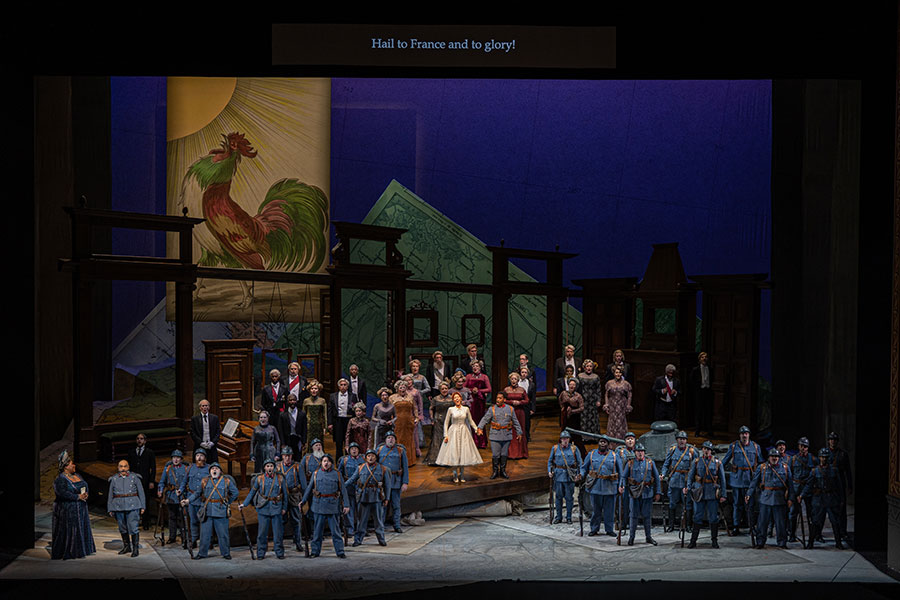
The Lyric Opera Chorus shines in Act Two of Donizetti's The Daughter of the Regiment
Has Maestro Hrůša given much direction to the chorus?
McCord
It's extra special to do a Czech opera with a Czech conductor. And he is, I think, kind of remarkable in how much he trusts that he can keep asking us for more detail, even changing some things that we have learned, to make it better and better. It takes confidence from the conductor — confidence in us — to even ask. And it's a very good situation. He's a great leader in the sense that, because he knows the language, he knows what he wants to hear. He's keying in very much on the diction, but he's also the leader of the overall musical experience, so he can choose where he wants to put that balance point. There may be a word where he says, 'This has to have this emphasis. I know it's not necessarily set that way in the music.' Having a person in that position who has both of those skills is a huge resource because hopefully it will be present and make a better final product for the audience.
Wilson
It's remarkable – to build it from the ground up, and do our due diligence in the rehearsal room and outside the rehearsal room, to make sure that we know what we're saying and why we're saying it, so that we can still give an informed performance.
Let me ask you both, as artists, is it challenging to switch gears from one language to the next?
McCord
To me, the hardest language is Russian because it has lots of funky vowels and lots of consonants. Czech is not that hard. I mean, it's a lot of consonants and consonant clusters that we don't have in English, but the vowels are easy.
Wilson
We might look at a three-syllable word. I don't know what it is, let's look it up. The poetic translation may not tell you exactly what the word means. But luckily, in this situation, Maestro Hrůša will say, 'Oh, that word, the last syllable needs to be emphasized.' It doesn't sound right if you're not doing that right. Whereas that might be more automatic in French, that's something we're very focused on in our Czech rehearsals. A native speaker will recognize that difference and it's important to us that that comes across well.
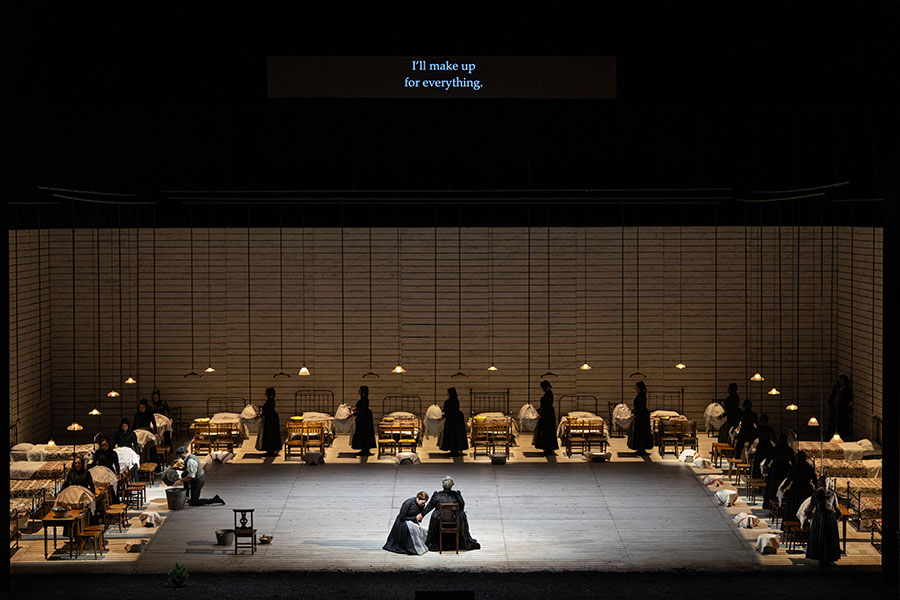
By showcasing the monotony and rigid structure of daily life in a small town, the Chorus helps illustrate the claustrophobic society in which Jenůfa finds herself.
It really makes a difference from an audience point of view.
Wilson
Absolutely.
McCord
Even if the audience doesn't speak the language at all, there's something that an audience senses. When the people on stage are in command of all the elements of the thing, the audience can be pulled more fully into the world we're creating. Through really detailed work, we create a detailed world that's more believable. If we're all kind of watercoloring and guessing, then it's just not a world that the audience can throw themselves into. One of the things that Jonathan's also alluding to is composers don't always set text idiomatically because sometimes they are emphasizing the musical line. That is something that we're always working with – not only the understanding of the language and understanding of the music, but how are the two fitting together at this moment by the composer.
I've noticed that, in review after review, the chorus earns high praise.
McCord
This is a great singer's town, and the fact that there is a core of us means that we can give all of our talent and focus on the product at Lyric.
Wilson
Maestro Black and all the staff coaches and pianists are just meticulous in making sure that we have all of the resources we need. The music is something that we have preloaded, and we are ready to execute on that so that we can create the world.
McCord
He's absolutely right, because the vocal talent is here, but it's really about the people with the skill sets to get us there and having the time that is required. That's Lyric.
See Jonathan and Kimberly along with the rest of the mighty Lyric Opera Chorus in two contrasting operas — Janáček's Jenůfa and Donizetti's The Daughter of the Regiment — this fall.

